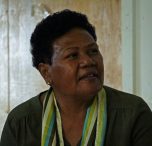Taveuni, Fiji – For many Pacific Islanders, living on islands means not having access to large areas of land for farming. It is, therefore, necessary to maintain fertility on small amounts of soil, so as to continue to be able to earn an income and grow food.
The island of Taveuni in Fiji is known as the Garden Island because of its lush vegetation. However, unsustainable land use has led to declines in soil fertility and dramatic decreases in crop yields, which threaten the livelihoods of farmers on the island. It shouldn’t be surprising then that the Taveuni farmers have been at the forefront of efforts to farm more sustainably, forming Tei Tei Taveuni in 2009 as a direct response to these problems.
“Like a mother nursing its babies, it needs to be fed, it needs to be looked after,” says Father Petero Matairatu of the Tutu Rural Training Centre in Taveuni, Fiji.
In 2015, Tei Tei Taveuni and the Pacific Island Farmers Organisation Network brought farmers from around the region together on Taveuni. The plan was to share their own experiences and to learn from other Pacific farmers how they could better care for their island. The Pacific Soil Learning Exchange was the first step for many farmers across the region to not only care for their soils but to generally farm more sustainably.
Promoting the sharing of information on sustainable soil management between farmer organisations has become a focal area for the regional network, with Taveuni a testing ground for many different approaches to sustainable agriculture, and through their passion and hard work, they are starting to see the results.
But the farmers of Taveuni are not the only ones making the move to sustainability and like ripples on a pond, the ideas sown back in 2015 are increasingly taking hold. More and more regional farmers are finding out that looking to the future also makes good business sense, and are finding that farmer organisations are able to provide them with the knowledge and tools, as well as connecting them with the right people to make the shift.

“The impact it had on us in Taveuni now with farmers using mucuna beans and where participants took home with them the mucuna beans they can plant for the fertility of their soils … to see firsthand the dalo farms using mucuna beans and the differences in their crop yields compared to the majority of the farms that did not use mucuna beans,” says Serenia Madigibuli of the Tutu Rural Training Centre.
Changing the mindset of farmers to take a longer-term view, and treat their farming as a lifelong and inter-generational calling isn’t always easy, but through persistence and practical experience, a lot of the ideas have now taken root and are set to flourish through the work of farmer organisations. #
About MTCP2
The Medium-Term Cooperation Program Phase 2 (MTCP2), a five-year capacity building program supported by the International Fund for Agricultural Development (IFAD), the Swiss Agency for Development and Cooperation (SDC), and the European Union (EU), has been implemented in 19 countries across three sub-regions—Southeast Asia, South Asia, and the Pacific—engaging 1,544 sub-national farmers organizations (FOs) with a total membership of around 22 million farmers. The funding support (total budget of $ 5 million for the whole duration of the project across 19 countries) serves as a catalytic fund that will allow FOs to enhance their capacity to be effective channels of economic services to farmers. The program has contributed to the formation of the strong national platform of FOs with improved capacity to engage in policy processes and mobilize resources from mainstream agricultural development programs like extension services, credit, and pre and post-harvest facilities. The program also helped in transforming farmers’ associations into commodity-based cooperatives to strengthen the role of small-scale farmers within an inclusive and sustainable value-chain. The program is being implemented by the consortium Asian Farmers’ Association for Sustainable Rural Development (AFA) and La Via Campesina (LVC).

Comments are closed